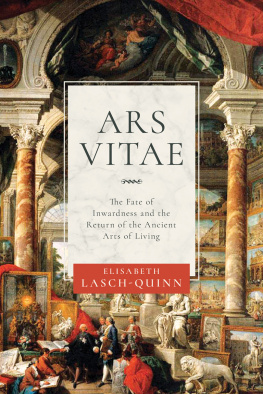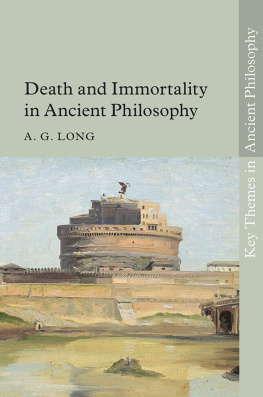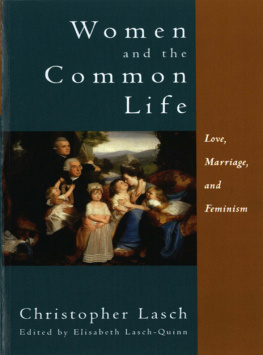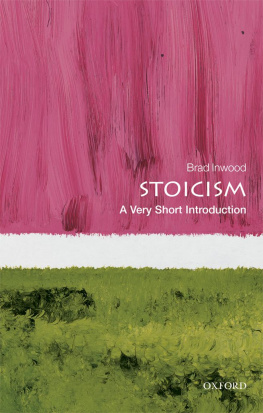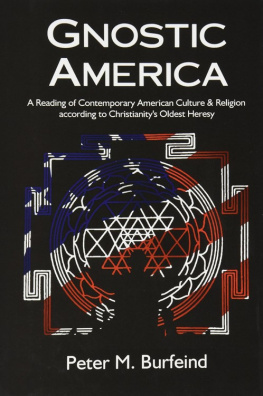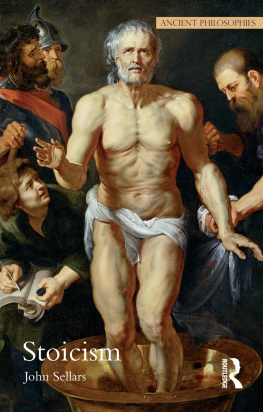Landmarks
Page-list
ADVANCE PRAISE
for
Ars Vitae: The Fate of Inwardness
and the Return of the Ancient Arts of Living
At a time when we are all too aware of the absence of a web of meaning to guide our life, it helps to draw on the moral resources provided by what Elisabeth Lasch-Quinn calls the ancient arts of living. She takes us on a philosophical journey to give us insights into the predicament we face in our inward life. After reading her beautifully written Ars Vitae, you, too, will want to embark on such a journey.
Frank Furedi, author of Why Borders Matter
An astute archeologist of ideas, Elisabeth Lasch-Quinn spies the finest remnants of our classical past lurking within the motley mess of contemporary life. In Ars Vitae, she reminds us, as Faulkner once did, that the past is not dead and that the old Greco-Roman approaches to the art of living still constellate our thoughts and customize our actions, consciously or not.
David Bosworth, author of Conscientious Thinking
In Ars Vitae, Elisabeth Lasch-Quinn provides a new way for us to think about the ways in which modern Americans strive to find meaning in, and strive to realize the potential of, their lives. The book sets into relief the peculiar ways in which Americans grasp at the question of how to live and ultimately calls for a new inwardness in American life. This is a masterwork of a book.
Susan McWilliams Barndt, author of
The American Road Trip and American Political Thought
With impressive learning and admirable literary grace, Elisabeth Lasch-Quinn calls on us to take seriously again what Cicero called the art of living. Drawing on a range of classical thinkers and schools, she demonstrates how true inwardness and self-knowledge are the antidotes to shallow consumerism and a narcissistic preoccupation with the self. This is a gem of a book, scholarship at the service of self-understanding and the search for truth.
Daniel J. Mahoney, author of
The Conservative Foundations of Liberal Order
Elisabeth Lasch-Quinn displays here an amazing familiarity with a vast and technical scholarly literature on ancient philosophynot only on its relevance to everyday life in present-day America. Her understanding of such sources is juxtaposed with her insight into present-day popular cultureits all quite astonishing. If ever a book deserved publishing, it is this one.
Daniel Walker Howe, Pulitzer Prize-winning author
of What Hath God Wrought
ARS
VITAE
ARS
VITAE

The Fate of
Inwardness and the
Return of the Ancient
Arts of Living
ELISABETH LASCH-QUINN
UNIVERSITY OF NOTRE DAME PRESS
NOTRE DAME, INDIANA
University of Notre Dame Press
Notre Dame, Indiana 46556
Copyright 2020 by Elisabeth Lasch-Quinn
All Rights Reserved
Published in the United States of America
Library of Congress Control Number: 2020940870
ISBN: 978-0-268-10889- 2 (Hardback)
ISBN: 978-0-268-10892-2 (WebPDF)
ISBN: 978-0-268-10891-5 (Epub)
This e-Book was converted from the original source file by a third-party vendor. Readers who notice any formatting, textual, or readability issues are encouraged to contact the publisher at
This book was selected as the 2020 Giles Family Fund Recipient. The University of Notre Dame Press and the author thank the Giles family for their generous support.
GILES FAMILY FUND RECIPIENTS
| 2019 | The Glory and the Burden: The American Presidency from FDR to Trump, Robert Schmuhl |
| 2020 | Ars Vitae: The Fate of Inwardness and the Return of the Ancient Arts of Living, Elisabeth Lasch-Quinn |
The Giles Family Fund supports the work and mission of the University of Notre Dame Press to publish books that engage the most enduring questions of our time. Each year the endowment helps underwrite the publication and promotion of a book that sparks intellectual exploration and expands the reach and impact of the university.
To my mother
and my husband
with love
CONTENTS
ACKNOWLEDGMENTS
To all who helped sustain the writing of this book, Ars Vitae is my expression of gratitude. To me, ars vitae means not just the art of living but your art of living.
Writing about how to live is a delicate matter, and I am grateful to all those who gave me the time, space, and resources to do so. A Fulbright fellowship at the University of Rome III in Italy and a research fellowship from the Religion and Innovation in Human Affairs Program of the Historical Society and John Templeton Foundation were priceless. James Davison Hunter played a pivotal role, with Joseph Davis and Jay Tolson at the Institute for Advanced Studies in Culture at the University of Virginia, which provided enriching discussions of my work in progress and a treasured yearlong nonresidential fellowship. At Syracuse University, the History Department, chaired by Michael Ebner and Norman Kutcher, and the Maxwell School provided research support, with a Pellicone faculty fellowship and funding for images and copyright permissions, and the Campbell Public Affairs Institute provided a research grant. Some paragraphs, used here with permission, originally appeared in The Mind of the Moralist, in the New Republic, August 28, 2006, 2731, and The New Old Ways of Self Help, in Hedgehog Review 19, no. 1 (Spring 2017).
I am grateful to dear colleagues, doctoral advisees, and other graduate and undergraduate students with whom I have worked most closely. You know who you are. As a modernist, I was fortunate to be able to return to earlier interests with new or renewed study in Italian, Latin, German, French, art history, comparative literature, and the history of Greece and Rome, and seminars with Michael Stocker (on love and on the philosophy of emotion), Patricia Miller (late antique philosophy and religion), Marcia Robinson (Kierkegaard), Albrecht Diem (medieval monasticism), and Craige Champion and Matthieu Van Der Meer (Latin). Deep gratitude goes to the memory of my uncle, classicist Steele Commager, who inspired my love of ancient words and ideas from a young age, and to Cynthia Farber-Soule, Charles Goldberg, Robby Ramdin, Paul Prescott, and the memories of Joseph Levine and Jean Bethke Elshtain for nurturing it. Talks with Bruce Laurie and Catherine Tumber were formative and writing sessions with Michael Fisher and Yoshina Hurgobin generative.
At the places I was invited to present my work in progress, those attending offered insights and inspiration: Albion Tourge Seminar in Intellectual History at the University of Rochester; Common Ground Initiative, Grand Valley State University, and Conference on Faith and History, Calvin College, both in Grand Rapids, Michigan; Front Porch Republic Conference, Spring Arbor University, Spring Arbor, Michigan; Maxwell Citizenship Initiative/Moynihan Institute Brownbag series, Confession symposium, and Chronos Undergraduate Conference, all at Syracuse University; The Human Person work group (which produced Figures in a Carpet) in Rockport, Massachusetts, and at the Woodrow Wilson International Center for Scholars, funded by the Pew Foundation; the Political Theory Colloquium, University of Notre Dame; the American Enterprise Institute; the Religion and Innovation in Human Affairs workshop, Harris Manchester College, University of Oxford, UK; the Universita degli Studi di Napoli in Naples, Italy; the Centro Studi Americani in Rome, Italy; and the Conversazioni in Italia symposium in Florence, Italy. Special thanks go to Robert Westbrook, Gleaves Whitney, John Fea, Wilfred McClay, Patrick Deneen, Arthur Brooks, Donald Yerxa, and all of my Italian hosts.

